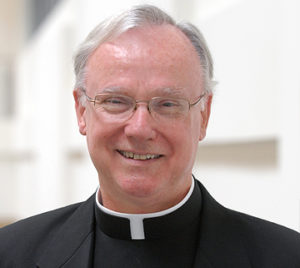Sixth Sunday of Easter
May 6, 2018

Readings:
First Reading: Acts 10:25-26, 34-35, 44-48
Responsorial Psalm: Psalm 98: 1, 2-3, 3-4
Second Reading: 1 John 4:7-10
Gospel: John 15: 9-17
Is God a Catholic?
Early in his papacy, Pope Francis startled an interviewer when he declared, “God is not a Catholic.” Of course, the Pope did not mean in any way to disparage the Catholic faith to which he has been faithful all his life and is now its visible head. His point was to remind us that God is “transcendent”–a being whose beauty and power are simply beyond our imagination and cannot be confined to any of our categories, however sacred they may be.
Or, perhaps, the Pope had just read the passage from the Acts of the Apostles that is the first reading for this Sunday. This selection comes at the end of a decisive event in the early church–where Peter the Apostle is prompted in a dream to go to the harbor city of Caesarea Maritima, the seat of Roman power, and there to accept into the Christian community the first Gentile–a Roman centurion named Cornelius. When Peter sees that the Spirit of God has embraced the faith of Cornelius and his household, the apostle proclaims a profound truth: “In truth, I see that God shows no partiality. Rather, in every nation whoever fears God and acts uprightly is acceptable to God.” It seems that Pope Francis’ predecessor was no less provocative than he! In the case of Peter, this affirmation of God’s all-embracing love had to be reconciled with Peter’s life-long conviction that Israel was God’s chosen people. Now he was to understand that the love of God embodied in Jesus reached out as well to include the people of “every nation.” And in this way, the Acts of the Apostles foresees the dynamic mission of the church that would go beyond the confines of Israel and, through the mission of Paul and other men and women of the early church, reach to the “ends of the earth.”
The foundation for all of this is laid out in the other major readings for this Sunday, both of them from the Johannine literature. The reading from the exquisite First Letter of John affirms a fundamental conviction of the New Testament: it is never a matter of us earning God’s love, but God has first loved us. Paul the Apostle would say the same thing to the Christians of Rome: “But God proves his love for us in that while we were still sinners Christ died for us” (Rom 5:8). In other words, God’s love comes first and is all-embracing and does not depend on our own virtue or pedigree. Human goodness is to be a response to God’s love, not its cause.
The gospel passage for today also proclaims this fundamental and astounding conviction of our Christian faith. It is taken from the final discourse of Jesus to his disciples found near the end of John’s Gospel. On the eve of his death Jesus–the Word of God made flesh–reaffirms his intense and abiding love for his disciples: “As the Father loves me, so I also love you.” To drive his point home, Jesus compares his love to the most intense form of human love possible: “No one has greater love than this, to lay down one’s life for one’s friends.” If someone gives their life for me, there is nothing further I can ask of them–there is no proof of love possible beyond this.
The message of this Sunday’s readings points to the reason why the mission of the Church must reach out to the world around us with respect and compassion and, yes, with love. Of course, our identity as Catholics remains essential–we have to know who we are and draw strength from our rich Catholic heritage: our Eucharist and sacraments, our spirituality, the example of our saints, the wisdom of the Church’s teaching. But at the core of that identity is the call to give witness to a God who loves the people “of every nation” and who embraces our world and creation itself. To be truly “catholic,” as our name itself implies, is to be universal.
Rev. Donald Senior, CP
President Emeritus, Chancellor
Professor of New Testament
This reflection is reprinted with permission from Fr. Senior’s regular column “Perspectives on Scripture” that appears in The Chicago Catholic, the newspaper of the Archdiocese of Chicago.